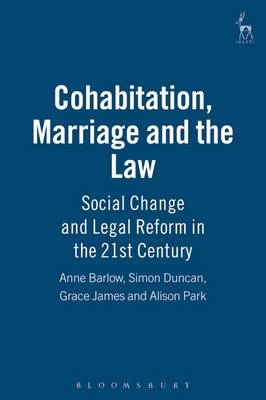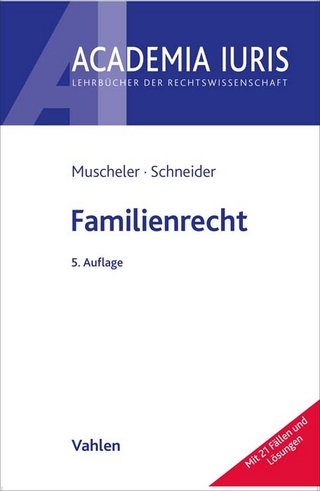
Cohabitation, Marriage and the Law
Social Change and Legal Reform in the 21st Century
Seiten
2005
Hart Publishing (Verlag)
978-1-84113-433-8 (ISBN)
Hart Publishing (Verlag)
978-1-84113-433-8 (ISBN)
This book considers public attitudes to cohabitation and marriage, looks at who cohabits and who marries and examines 'common law marriage'.
Unmarried heterosexual cohabitation is rapidly increasing in Britain and over a quarter of children are now born to unmarried cohabiting parents. This is not just an important change in the way we live in modern Britain; it is also a political and theoretical marker. Some commentators see cohabitation as evidence of selfish individualism and the breakdown of the family, while others see it as just a less institutionalised way in which people express commitment and build their families. Politically, 'stable' families are seen as crucial - but does stability simply mean marriage? At present the law in Britain retains important distinctions in the way it treats cohabiting and married families and this can have deleterious effects on the welfare of children and partners on cohabitation breakdown or death of a partner. Should the law be changed to reflect this changing social reality? Or should it - can it - be used to direct these changes?
Using findings from their recent Nuffield Foundation funded study, which combines nationally representative data with in-depth qualitative work, the authors examine public attitudes about cohabitation and marriage, provide an analysis of who cohabits and who marries, and investigate the extent and nature of the 'common law marriage myth' (the false belief that cohabitants have similar legal rights to married couples). They then explore why people cohabit rather than marry, what the nature of their commitment is to one another and chart public attitudes to legal change. In the light of this evidence, the book then evaluates different options for legal reform.
Unmarried heterosexual cohabitation is rapidly increasing in Britain and over a quarter of children are now born to unmarried cohabiting parents. This is not just an important change in the way we live in modern Britain; it is also a political and theoretical marker. Some commentators see cohabitation as evidence of selfish individualism and the breakdown of the family, while others see it as just a less institutionalised way in which people express commitment and build their families. Politically, 'stable' families are seen as crucial - but does stability simply mean marriage? At present the law in Britain retains important distinctions in the way it treats cohabiting and married families and this can have deleterious effects on the welfare of children and partners on cohabitation breakdown or death of a partner. Should the law be changed to reflect this changing social reality? Or should it - can it - be used to direct these changes?
Using findings from their recent Nuffield Foundation funded study, which combines nationally representative data with in-depth qualitative work, the authors examine public attitudes about cohabitation and marriage, provide an analysis of who cohabits and who marries, and investigate the extent and nature of the 'common law marriage myth' (the false belief that cohabitants have similar legal rights to married couples). They then explore why people cohabit rather than marry, what the nature of their commitment is to one another and chart public attitudes to legal change. In the light of this evidence, the book then evaluates different options for legal reform.
Anne Barlow is a Reader in Law at Exeter University. Simon Duncan is Professor in Comparative Social Policy at the University of Bradford. Grace James is a Lecturer in Law at the University of Reading. Alison Park is Research Director at the National Centre for Social Research and Co-Director of the British Social Attitudes Survey series.
1 Introduction
2 Marriage and Cohabitation in Britain: Changing Attitudes and Behaviour
3 The Common Law Marriage Myth and ‘Lived Law’: An Analysis of Beliefs
4 Why Cohabit?
5 Changing Law: Social Attitudes to Cohabitation Law, Law Reform and the Legal Response
6 Reforming the Law: Options for Cohabitation
| Erscheint lt. Verlag | 23.6.2005 |
|---|---|
| Verlagsort | Oxford |
| Sprache | englisch |
| Maße | 156 x 234 mm |
| Themenwelt | Recht / Steuern ► EU / Internationales Recht |
| Recht / Steuern ► Privatrecht / Bürgerliches Recht ► Familienrecht | |
| Sozialwissenschaften ► Soziologie ► Mikrosoziologie | |
| ISBN-10 | 1-84113-433-3 / 1841134333 |
| ISBN-13 | 978-1-84113-433-8 / 9781841134338 |
| Zustand | Neuware |
| Haben Sie eine Frage zum Produkt? |
Mehr entdecken
aus dem Bereich
aus dem Bereich
Ehe, Scheidung, Unterhalt, Versorgungsausgleich, Internationales …
Buch | Softcover (2024)
dtv Verlagsgesellschaft
CHF 26,45


